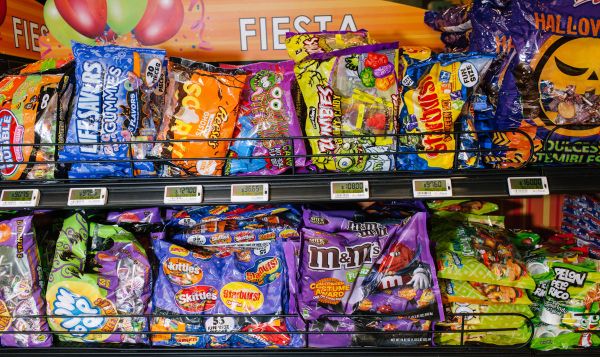It's been a fixture of Donald Trump's campaign rallies: Global trade is a problem for U.S. workers, and the source of their pain can be found in some other country. Most often Mexico and China get the blame, but the culprit might also be Vietnam or South Korea. These countries, the Republican candidate likes to say, are "eating our lunch."
Turns out Trump's metaphor is, in one sense, objectively true - just not exactly how he would have voters believe.
An American browsing the aisles of a Selecto supermarket such as this one just outside Mexico City would find much that is familiar. Mexicans at this upscale grocery in Naucalpan are scooping Cap'n Crunch cereal for breakfast, eating U.S. beef for lunch, and snacking on Oreo cookies after dinner, all brought across Mexico's northern border.
Nabisco, the manufacturer of Oreos and other snacks, has indeed opened a factory in Mexico—something Trump likes to note in his campaign appearances. But that hasn't stopped discerning Mexican shoppers from buying Oreo, Chips Ahoy!, and another 10 kinds of Nabisco cookies imported from the U.S.
In all, Selecto imports up to 15 percent of its inventory, and most of those imports come from the U.S. The chain, owned by a domestic competitor to Wal-Mart known as Grupo Comercial Chedraui, is one of a growing number of stores that have cropped up in the past five years that cater to Mexico's expanding middle class by offering more variety.
A supermarket offers an unusually clear window into the trade partnership between Mexico and the U.S., in which goods from auto parts to oil cross the border several times, creating jobs on both sides before they're ready for sale.
Mexico imports far more from the U.S. than from anywhere else, and those shipments have tripled since the North American Free Trade Agreement took effect in 1994.
Food and beverages are no exception: Of all the food Mexico imports, nearly four-fifths comes from the U.S. Tyson Foods and Coca-Cola are among the biggest sellers of American products in Mexico, according to Mexican government data. Even Mexican beer relies on ingredients made in America: Mexico imports more than six times as much American malt as it did before NAFTA.
For more on this story, listen to the latest Bloomberg Benchmark podcast with Nacha Cattan, Dan Moss, Kate Smith, and Scott Lanman.
Original article


